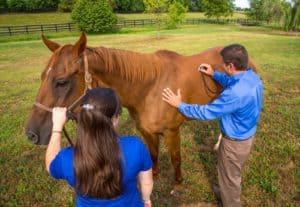
Immunity to Cyathostomins and its Impact on Control Program
Equine Parasitology Symposium Video Series

Equine Parasitology Symposium Video Series
The University of Kentucky (UK) Equine Initiative will hold an all-equine field day, from 9 a.m. to 3 p.m. Saturday, June 27, on UK’s Maine Chance Equine Campus on Newtown Pike, just north of Interstate 75. Admission is free, and
Postmortem testing conducted by University of Florida College of Veterinary Medicine pathologists and toxicologists on a group of prized polo horses that collapsed and died April 19 in Wellington, Fla., drew international attention, with riveted members of the public and the press wanting answers about the mysterious cause of death.
Blood and tissue samples were gathered from 15 horses o
Bettina Wagner, DVM, PhD, assistant professor of immunology at Cornell’s College of Veterinary Medicine, has been named the Harry M. Zweig Assistant Professor in Equine Health. The three-year term endowed position recognizes a junior faculty member who shows promise and productivity in the field of equine research.
Wagner’s research focuses on equine immunology. She studies the regulatio
The discussion on hormone therapy in the mare followed a systematic progression through three broad areas: 1) hastening the onset of (ovarian) follicular activity and ovulation in winter anestrus (noncycling) mares; 2) synchronizing ovulation in cycling mares; and 3) blocking estrous behavior (i.e., heat) in mares.
At the Compounding Table Topic at the 2008 American Association of Equine Practitioners (AAEP) convention, held Dec. 6-10 in San Diego, Calif., facilitators made handouts available, including the FDA’s Compliance Policy Guide (CPG); the Animal Medicinal Drug Use Clarification Act of 1994 (AMDUCA), the AAEP Position Statement/Guidelines for Use of Compounded Products, and a couple of
The Middleburg Agricultural Research and Extension Center (MARE Center) will host a Technical Large Animal Emergency Rescue Training (TLAER) training session May 13-15, 2009.
Instructors Tomas Gimenez, DrMedVet, and Rebecca Gimenez, PhD, manage the TLAER organization. They lead training for members of the emergency response community nationwide. This course covers the latest concept
What makes your horse different from the horse in the next stall? Why doesn’t a Kentucky Derby contender walk like a Budweiser Clydesdale? Why don’t either of them look like Thumbelina, the Guinness Book of World Records’ smallest living horse?
The domestic horse comes in a range of sizes, shapes, and
Much like asthma in humans, equine heaves is a chronic, often debilitating disease in horses. The clinical signs can range from coughing and work intolerance to labored breathing, even at rest.
Virginia Buechner-Maxwell, DVM, MS, Dipl. ACVIM, a professor in the Department of Large Animal Clinical Sciences in the Virginia-Maryland Regional College of Veterinary Medicine at Virginia Tech,
Recently, there have been some questions directed to the United States Equestrian Federation (USEF) Equine Drugs and Medications Program related to the use of liniments. The specific liniments in question are:
Equi-Block Liniments by
Ask Marianela Lopez, DVM, PhD, how long she has been studying Rhodococcus bacteria and she says, laughing, “Since I was born? Well, truthfully, since I began my PhD at Washington State University in 1996–it does seem a lifetime ago.”
Lopez is a member of a new team studying Rhodococcus equi infection of foals, supported by an award from the Heather Ryan and L. David Dubé
Michelle Henry Barton, DVM, PhD, Dipl. ACVIM, a University of Georgia College of Veterinary Medicine professor known as an inspiring teacher and mentor and an accomplished researcher, has been appointed to a Fuller E. Callaway Professorial Chair
The Veterinary Medical Teaching Hospital at Texas A&M University College of Veterinary Medicine & Biomedical Sciences will be adding a veterinary imaging and cancer treatment center.
“The College of Veterinary Medicine is dedicated to maintain state-of-the-art instrumentation that improves the clinical services we provide our
Michael Blackwell, DVM, MPH, dean of the University of Tennessee (UT) College of Veterinary Medicine has announced he plans to retire. Blackwell will leave his position January 1, 2008. His retirement will be effective March 1, 2008.

I am looking for general information regarding my vet and horse care. What should I expect from my vet?
Elizabeth Adkins, DVM, Dipl. ACVO, a board-certified veterinary ophthalmologist, has joined the staff at the University of Wisconsin-Madison School of Veterinary Medicine, effective Aug. 22.
She will practice partly on-site at the school’s
Stay on top of the most recent Horse Health news with
© 2022 Copyright Statement dolor sit amet, consetetur sadipscing User Terms, sed diam nonumy eirmod tempor invidunt ut labore et dolore magna aliquyam erat, sed diam voluptua. At vero eos et accusam et justo duo dolores et ea rebum. Stet clita kasd gubergren, no sea takimata sanctus est Lorem ipsum dolor sit amet.